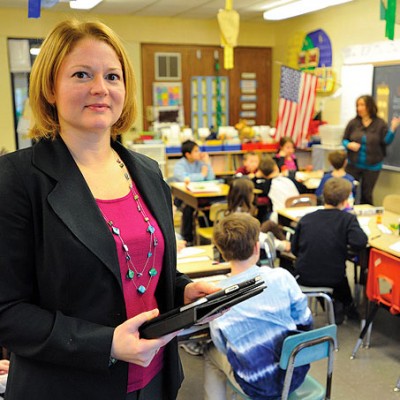
As a school psychologist and school administrator who specialized in working with behaviorally challenged children, Dr. Sandra Chafouleas learned first hand that schools are held accountable, not only for educating students, but also for addressing students’ behavioral issues and helping them to develop their social skills.
“We’re well beyond the days of reading, writing and arithmetic,” says Chafouleas, who joined the Department of Educational Psychology faculty at the Neag School of Education in 2000, noting that schools “have to be able to identify problems early and make informed decisions about what to do when these problems arise.”
With her distinctive professional expertise, Chafouleas is able to offer valuable insight into the field of school psychology as a professor in Neag’s program. Today she works closely with students of a different age – graduate students and postdoctoral fellows whom she teaches, mentors and guides in a diverse range of research projects in educational psychology.
While her teaching skills earned her the UConn Alumni Association‘s Excellence in Graduate Teaching Award in 2009, Chafouleas’ own scholarship as a research scientist in Neag’s Center for Behavioral Education and Research has been significant as well. Publishing prolifically over the past 10 years, including more than 80 journal articles, she has been awarded nearly $3.5 million in research grants. Much of her recent work has focused on the area of behavioral assessment –an area where she, having worked alongside children with behavioral issues, saw a gap in the research.
Funded by a four-year, $1.5 million grant from the U.S. Department of Education, Chafouleas’ current research has centered in part on a rating system used by schoolteachers to monitor students’ patterns of behavior in the classroom. Using the data they collect with this behavior rating system, teachers can more easily evaluate students’ conduct and provide them and their parents or other teachers with specific feedback about their behavior. With a new $2.3 million grant from the U.S. Department of Education coming into place, Chafouleas will continue to evaluate the utility of this behavior assessment system on a larger scale over the next four years.
Chafouleas and her co-investigators are working to evaluate the validity and usefulness of such behavioral assessment tools. As she explains, expanding on research in this area is essential to determine “how we can build tools to communicate better across systems such as home and school, and how can we track student behavior over time in a way that is efficient and easy.”
Developing effective behavior rating tools may not only offer reliable quantitative data about students’ behavior, Chafouleas says, but also ultimately help prevent disruptions in the classroom and improve students’ academic performance as well as their behavioral and social interactions
 Facebook
Facebook
 Twitter
Twitter
 LinkedIn
LinkedIn
